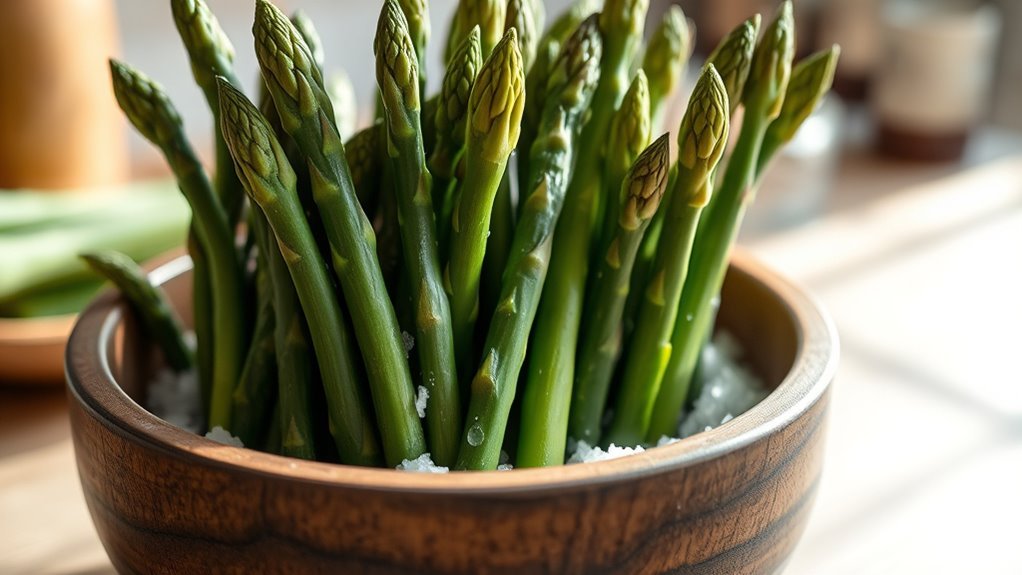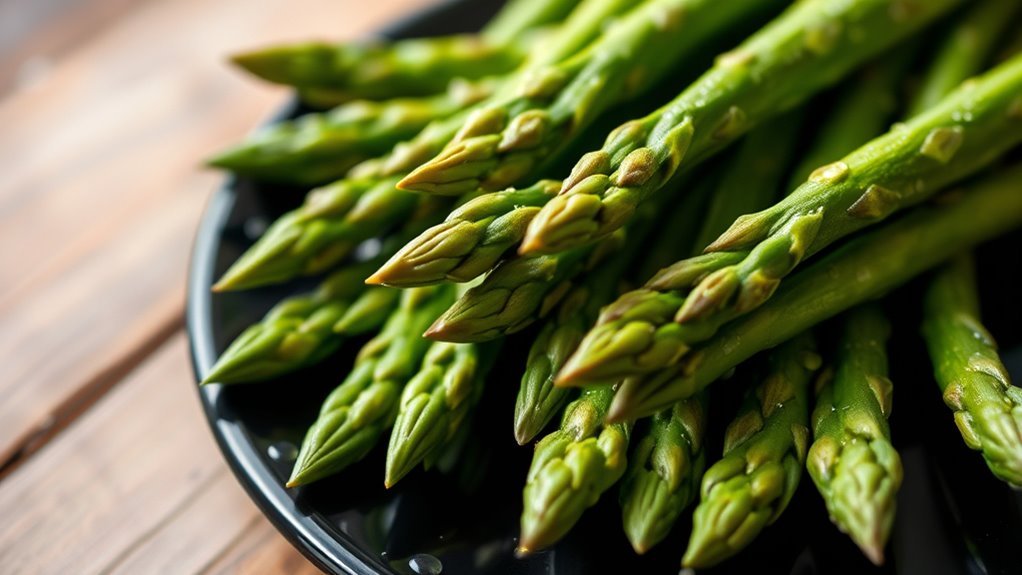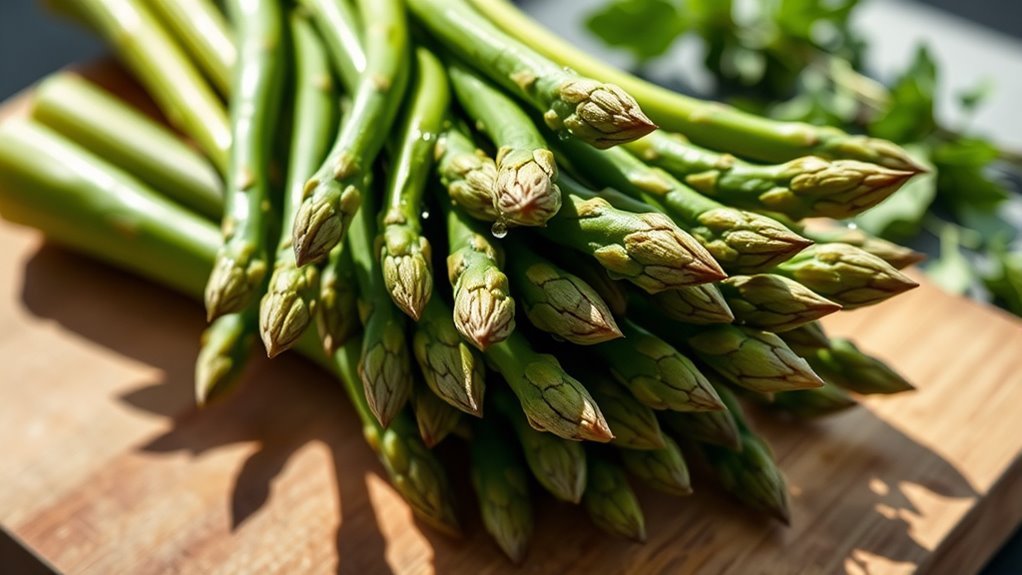Yes, asparagus is keto-friendly! It’s low in carbs, with just about 3.7 grams of net carbs per 100 grams, making it a great choice for your ketogenic diet. This nutrient-dense vegetable provides essential vitamins and fiber, promoting gut health and satiety. You’ll enjoy various health benefits, like enhanced immune support and antioxidant properties. There are great ways to incorporate asparagus into your meals, and there’s much more to learn about preparation and recipe ideas.
Understanding the Ketogenic Diet

When you consider the ketogenic diet, it’s essential to understand its core principles. The ketogenic basics focus on drastically reducing carbohydrate intake while increasing fat consumption. This shift aims to put your body into a state of ketosis, where it burns fat for fuel instead of carbohydrates. Typically, the diet principles recommend that around 70-75% of your daily caloric intake comes from fats, 20-25% from protein, and only 5-10% from carbs. By embracing this macronutrient ratio, you’re likely to experience benefits such as improved energy levels and mental clarity. However, it’s vital to approach this diet thoughtfully, considering its potential impacts on your overall health and lifestyle. Knowledge about the ketogenic diet empowers you to make informed choices that align with your goals. Additionally, understanding the importance of ketosis can enhance your success on the diet.
Nutritional Profile of Asparagus

Asparagus is not only low in calories but also offers a unique macronutrient profile that can fit well into a ketogenic diet. You’ll find it packed with fiber, which aids digestion, along with a variety of essential vitamins and minerals that contribute to overall health. Understanding these aspects can help you make informed choices about including asparagus in your meals.
Macronutrient Breakdown
While many vegetables can fit into a keto diet, it’s essential to look closely at their macronutrient profiles, and asparagus stands out as a particularly good option. This vegetable is low in carbohydrates, with about 3.7 grams of net carbs per 100 grams, making it ideal for your keto meals. Asparagus varieties, such as green, purple, and white, offer slight variations in taste and nutrient content, but they all maintain low carb counts. When preparing asparagus, consider these cooking tips: roasting or grilling enhances its flavor while keeping it keto-friendly. With its rich array of vitamins and minerals, asparagus not only fits into your diet but also supports your overall health goals without compromising your freedom in food choices. Additionally, incorporating leafy greens alongside asparagus can further enhance your nutrient intake while sticking to your keto plan.
Fiber Content
Although it may not be the first vegetable that comes to mind, asparagus is a great source of dietary fiber, which is essential for maintaining digestive health. Incorporating this delicious veggie into your diet offers numerous asparagus benefits, especially when you’re seeking healthy fiber sources.
Consider these fiber facts about asparagus:
- It’s low in calories and high in nutrients.
- A serving contains about 2 grams of fiber, promoting satiety.
- Fiber aids in regulating blood sugar levels, vital for a keto lifestyle.
- It supports gut health by feeding beneficial bacteria.
- Asparagus is also a nutrient-dense option that can enhance your overall nutritional intake while following a keto diet.
Vitamins and Minerals
When it comes to vitamins and minerals, few vegetables can match the impressive nutritional profile of asparagus. This green spear is packed with essential vitamins, particularly vitamins A, C, E, and K, which support your immune system, skin health, and blood clotting. Its vitamin content plays a crucial role in your overall well-being.
As for mineral benefits, asparagus is a good source of potassium, which helps regulate blood pressure, and folate, important for DNA synthesis and repair. Additionally, it contains trace minerals like iron and calcium that contribute to various bodily functions. Incorporating asparagus into your meals not only enhances flavor but also boosts your nutrient intake, aligning perfectly with a healthy lifestyle.
Carb Count: Is Asparagus Low in Carbs?

If you’re following a keto diet, you might be wondering about the carb count of asparagus. Great news! Asparagus is not only delicious but also low in carbs, making it an excellent choice for your meals. Here’s a quick look at the carb content:
- One cup of cooked asparagus contains about 5 grams of carbs.
- It has around 2.5 grams of fiber, which can lower net carbs.
- Different asparagus varieties may have slight variations in carb count.
- Incorporating asparagus into your diet aligns with keto tips for maintaining low carbohydrate intake. Additionally, non-starchy vegetables like asparagus are essential for nutritional balance on a keto diet.
Health Benefits of Asparagus
Asparagus is packed with essential nutrients, making it a valuable addition to your diet. It’s rich in vitamins A, C, E, and K, along with antioxidants that help combat oxidative stress in your body. Incorporating asparagus into your meals can support overall health and well-being.
Nutrient-Rich Profile
Although many vegetables boast health benefits, asparagus stands out with its impressive nutrient-rich profile. This versatile vegetable not only enhances your meals but also supports your health in various ways.
Consider these asparagus benefits for nutrient absorption:
- Vitamins A, C, E, and K: Essential for immune function and bone health.
- Folate: Important for cell division and overall growth.
- Fiber: Aids in digestion and helps you feel fuller longer.
- Minerals like potassium and iron: Support heart health and oxygen transport in the blood.
Incorporating asparagus into your diet can markedly boost your nutrient intake, making it a perfect fit for a keto lifestyle. Enjoying it regularly can guarantee you’re reaping all the health benefits it has to offer.
Antioxidant Properties
While you may enjoy asparagus for its taste and versatility, its antioxidant properties are equally remarkable. This vegetable is packed with antioxidants like vitamins C and E, which can help combat oxidative stress in your body. Antioxidant benefits include the ability to neutralize free radicals, potentially reducing the risk of chronic diseases. Asparagus also contains glutathione, a powerful antioxidant that plays a vital role in free radical reduction and detoxification. By incorporating asparagus into your diet, you’re not just savoring its flavor; you’re actively supporting your health. These properties make it an excellent choice for those seeking a balanced, keto-friendly lifestyle that prioritizes nutrient-dense foods. So, why not add this nutrient powerhouse to your next meal?
How to Incorporate Asparagus Into Your Keto Meals
When you’re looking to add variety to your keto meals, incorporating asparagus can be a delicious and nutritious choice. This versatile vegetable is low in carbs and rich in fiber, making it perfect for your diet. Here are some simple ways to include asparagus in your meals:
Incorporate asparagus into your keto meals for a nutritious, low-carb addition that adds flavor and variety.
- Toss chopped asparagus into fresh asparagus salads for a crunchy texture.
- Serve roasted asparagus as a side dish, drizzled with olive oil and seasoning.
- Blend it into a creamy soup for a satisfying starter.
- Add it to your omelets or scrambled eggs for a nutritious breakfast boost.
With these ideas, you’ll not only enjoy the health benefits of asparagus but also keep your meals exciting and flavorful.
Cooking Methods for Keto-Friendly Asparagus
If you’re looking to make asparagus a staple in your keto diet, understanding the best cooking methods can enhance both its flavor and nutritional value. Grilling techniques are a fantastic option; they not only caramelize the natural sugars but also add a smoky flavor. Just toss asparagus with olive oil, salt, and pepper, then grill for about 5-7 minutes until tender-crisp. Sautéing tips are equally effective; using a bit of butter or ghee keeps it keto-friendly. Cook over medium heat for about 3-5 minutes, stirring frequently to prevent burning. Both methods retain the asparagus’s nutrients while adding delicious taste, making them perfect for your low-carb lifestyle. Enjoy experimenting to find your favorite way to prepare this versatile vegetable!
Asparagus vs. Other Vegetables: A Comparison
As you explore your keto options, it’s essential to compare asparagus with other low-carb vegetables to make informed dietary choices. Asparagus stands out due to its unique benefits, but it’s helpful to see how it stacks up against others:
- Spinach: Packed with iron, low in carbs, and also offers antioxidants.
- Zucchini: Versatile and low-calorie, great for replacing pasta in dishes.
- Broccoli: High in fiber and vitamin C, providing a satisfying crunch.
- Cauliflower: Low in carbs and great for making keto-friendly rice or pizza crusts.
These vegetable comparisons highlight asparagus benefits like fiber and vitamins while keeping your carb intake in check. Additionally, broccoli offers essential nutrients that support keto goals, making it a fantastic option for your diet. When choosing your keto-friendly veggies, consider what aligns best with your health goals!
Potential Concerns With Asparagus on a Keto Diet
While asparagus is a popular choice among low-carb vegetables, there are some potential concerns to contemplate when incorporating it into a keto diet. For instance, some individuals may experience asparagus allergies, which can lead to symptoms like skin rashes or gastrointestinal distress. It’s essential to pay attention to how your body reacts after consuming asparagus. Additionally, digestive issues may arise, particularly if you’re not accustomed to high-fiber foods. While asparagus provides beneficial nutrients, sudden increases in fiber intake can lead to bloating or discomfort. If you find yourself experiencing these concerns, consider moderating your intake or consulting a healthcare professional. Ultimately, understanding your body’s unique responses will empower you to make informed dietary choices on your keto journey.
Recipes Featuring Asparagus for Keto Enthusiasts
Whether you’re looking to spice up your keto meal plan or simply enjoy the health benefits of asparagus, there are plenty of delicious recipes to explore. Asparagus is low in carbs and high in nutrients, making it a fantastic choice for keto enthusiasts. Consider trying these dishes:
Discover the delicious versatility of asparagus with these keto-friendly recipes that are both nutritious and satisfying.
- Roasted asparagus with olive oil, garlic, and a sprinkle of parmesan
- Asparagus salads featuring feta cheese, cherry tomatoes, and a lemon vinaigrette
- Grilled asparagus wrapped in prosciutto for a savory snack
- Creamy asparagus soup blended with coconut milk for a comforting meal
These recipes not only highlight the versatility of asparagus but also keep your meals exciting while staying within your keto guidelines. Enjoy the freedom to create and indulge!
Frequently Asked Questions
Can Asparagus Cause Digestive Issues on a Keto Diet?
Asparagus can cause digestive issues for some people on a keto diet, mainly due to its high fiber content. While asparagus offers numerous benefits, like promoting digestive health and providing essential nutrients, the increased fiber may lead to bloating or gas in those not accustomed to it. If you’re sensitive to fiber, it’s best to consume asparagus in moderation and listen to your body’s signals to maintain your comfort and health.
Is Frozen Asparagus as Healthy as Fresh Asparagus?
Yes, frozen asparagus can be as healthy as fresh asparagus. Freezing helps preserve nutrient retention, so it often retains vitamins and minerals effectively. In fact, frozen benefits include convenience and longer shelf life, making it easier for you to include this nutritious veggie in your meals. While fresh asparagus is great, don’t underestimate the value of frozen options; they can still provide essential nutrients and contribute to a balanced diet.
How Much Asparagus Can I Eat on a Keto Diet?
Asparagus allows ample appetite within keto guidelines! You can enjoy about one to two servings per day, which translates to roughly 100-200 grams. This veggie’s low-carb count makes it a fantastic fit for your keto meals. Remember, moderation’s key: while asparagus is nutritious, balance it with other low-carb veggies to guarantee a diverse diet. So, savor those savory spears and keep your meals exciting while sticking to your keto goals!
Does Asparagus Have Any Allergens to Consider?
Asparagus allergies are quite rare, but they can occur. If you have a known allergy to other members of the lily family, like onions or garlic, you might want to be cautious due to potential cross-reactivity concerns. It’s always wise to introduce any new food slowly and monitor your body’s response. If you have specific allergies, consulting with a healthcare professional can help guarantee you enjoy asparagus safely.
Can I Drink Asparagus Juice on a Keto Diet?
You can definitely enjoy asparagus juice on a keto diet, like sipping liquid sunshine. Packed with asparagus benefits, it’s low in carbs and high in nutrients, making it a great addition to your meals. Look for juice recipes that blend asparagus with other keto-friendly ingredients, like cucumber or lemon, to enhance flavor and nutrition. Just keep an eye on the total carb count to confirm it fits into your daily allowance.
Frequently Asked Questions about Asparagus and Keto
1. Is asparagus a keto-friendly vegetable?
Yes, asparagus is considered a keto-friendly vegetable. It is low in carbohydrates, with approximately 2 grams of net carbs per 100 grams. This makes it an excellent choice for those following a ketogenic diet, as it allows you to enjoy a nutritious vegetable without exceeding your daily carb limit.
2. How many carbs are in asparagus?
Asparagus contains about 4 grams of total carbohydrates per 100 grams, but when considering dietary fiber (which is not digestible), the net carbs drop to around 2 grams. This low carb count makes it suitable for a ketogenic diet.
3. What are the health benefits of asparagus on a keto diet?
Asparagus is rich in vitamins A, C, E, and K, as well as folate and antioxidants. It supports digestive health due to its fiber content, aids in weight management, and contributes to heart health. Additionally, its low carbohydrate content aligns well with the goals of a ketogenic diet, helping to maintain ketosis while providing essential nutrients.
4. Can I eat asparagus in large quantities on a keto diet?
While asparagus is low in carbs, it’s important to consume it in moderation, as with any vegetable. Eating large quantities could add up in carbs and may interfere with your keto goals. A sensible serving of asparagus, alongside other low-carb vegetables, can help maintain a balanced diet while sticking to keto.
5. How can I incorporate asparagus into my keto meals?
Asparagus can be enjoyed in various ways on a keto diet. You can grill or roast it with olive oil and seasonings, add it to salads for crunch, or blend it into soups. It also pairs well with protein sources like chicken or fish. Experimenting with different cooking methods can help you incorporate asparagus into your meals while keeping your carb intake low.
References
- https://www.healthline.com/nutrition/is-asparagus-keto
- https://www.medicalnewstoday.com/articles/324203
- https://www.wikihow.com/Include-Asparagus-in-a-Keto-Diet
- https://www.dietdoctor.com/low-carb/vegetables/asparagus
- https://www.ncbi.nlm.nih.gov/pmc/articles/PMC7071280/
- https://www.verywellfit.com/asparagus-nutrition-facts-4111217


